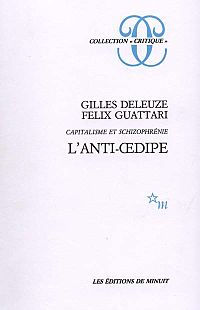 W
WAnti-Oedipus: Capitalism and Schizophrenia is a 1972 book by French authors Gilles Deleuze and Félix Guattari, respectively a philosopher and a psychoanalyst. It is the first volume of Capitalism and Schizophrenia, the second being A Thousand Plateaus (1980).
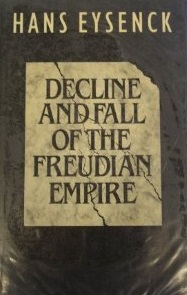 W
WDecline and Fall of the Freudian Empire is a book by the psychologist Hans Eysenck, in which the author criticizes Sigmund Freud, the founder of psychoanalysis. Eysenck argues that psychoanalysis is unscientific. The book received both positive and negative reviews. Eysenck has been criticized for his discussion of the physician Josef Breuer's treatment of his patient Anna O., whom Eysenck argues suffered from tuberculous meningitis.
 W
WThe Denial of Death is a 1973 work of psychology and philosophy by the cultural anthropologist Ernest Becker, in which the author builds on the works of Søren Kierkegaard, Sigmund Freud, Norman O. Brown and Otto Rank. It was awarded the Pulitzer Prize for General Non-Fiction in 1974, two months after the author's death.
 W
WThe Discovery of the Unconscious: The History and Evolution of Dynamic Psychiatry is a 1970 book about the history of dynamic psychiatry by the Swiss medical historian Henri F. Ellenberger, in which the author discusses such figures as Franz Anton Mesmer, Sigmund Freud, Pierre Janet, Alfred Adler, and Carl Jung. The book was first published in the United States by Basic Books. The work has become a classic, and has been credited with correcting older estimates of Freud's level of originality and encouraging scholars to question the scientific validity of psychoanalysis. Critics have questioned the reliability of some of Ellenberger's judgments.
 W
WThe Ego in Freud's Theory and in the Technique of Psychoanalysis is the 1988 English-language translation of published in Paris by Le Seuil in 1977. The text of the Seminar, which was held by Jacques Lacan at the Hospital of Sainte-Anne in Paris between the Fall of 1954 and the Spring of 1955 and is the second one in the series, was established by Jacques-Alain Miller and translated by Sylvana Tomaselli.
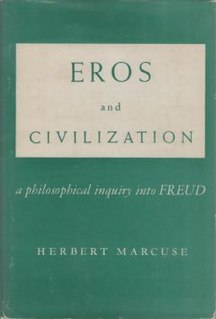 W
WEros and Civilization: A Philosophical Inquiry into Freud is a book by the German philosopher and social critic Herbert Marcuse, in which the author proposes a non-repressive society, attempts a synthesis of the theories of Karl Marx and Sigmund Freud, and explores the potential of collective memory to be a source of disobedience and revolt and point the way to an alternative future. Its title alludes to Freud's Civilization and Its Discontents (1930). The 1966 edition has an added "political preface".
 W
WThe Foundations of Psychoanalysis: A Philosophical Critique is a 1984 book by the philosopher Adolf Grünbaum, in which the author offers a philosophical critique of the work of Sigmund Freud, the founder of psychoanalysis. The book was first published in the United States by the University of California Press. Grünbaum evaluates the status of psychoanalysis as a natural science, criticizes the method of free association and Freud's theory of dreams, and discusses the psychoanalytic theory of paranoia. He argues that Freud, in his efforts to defend psychoanalysis as a method of clinical investigation, employed an argument that Grünbaum refers to as the "Tally Argument"; according to Grünbaum, it rests on the premises that only psychoanalysis can provide patients with correct insight into the unconscious pathogens of their psychoneuroses and that such insight is necessary for successful treatment of neurotic patients. Grünbaum argues that the argument suffers from major problems. Grünbaum also criticizes the views of psychoanalysis put forward by other philosophers, including the hermeneutic interpretations propounded by Jürgen Habermas and Paul Ricœur, as well as Karl Popper's position that psychoanalytic propositions cannot be disconfirmed and that psychoanalysis is therefore a pseudoscience.
 W
WThe Four Fundamental Concepts of Psychoanalysis is the 1978 English-language translation of a seminar held by Jacques Lacan. The original was published in Paris by Le Seuil in 1973. The Seminar was held at the École Normale Supérieure in Paris between January and June 1964 and is the eleventh in the series of The Seminar of Jacques Lacan. The text was published by Jacques-Alain Miller.
 W
WFreud Evaluated: The Completed Arc is a book by the psychologist Malcolm Macmillan, in which the author criticizes the theories and procedures of Sigmund Freud, the founder of psychoanalysis. It was first published in 1991 by Elsevier Science. The second edition has a foreword by the critic Frederick Crews.
 W
WFreud, Biologist of the Mind: Beyond the Psychoanalytic Legend is a 1979 biography of Sigmund Freud, the founder of psychoanalysis, by the psychologist Frank Sulloway.
 W
WGroup Psychology and the Analysis of the Ego is a 1921 book by Sigmund Freud, the founder of psychoanalysis.
 W
WHermeneutics and the Human Sciences: Essays on language, action and interpretation is a book by the philosopher Paul Ricœur, in which the author discusses hermeneutics and the human sciences. The work received positive reviews, praising Ricœur's discussions of topics such as the debate between the philosophers Hans-Georg Gadamer and Jürgen Habermas. Commentators have noted that Ricœur modifies views about psychoanalysis expressed in his work Freud and Philosophy (1965).
 W
WThe Homosexual Matrix is a book by American psychologist Clarence Arthur Tripp, in which the author discusses the biological and sociological implications of homosexuality, and also attempts to explain heterosexuality and bisexuality. The book was first published in 1975 by McGraw-Hill Book Company; it was republished in a revised edition in 1987. Based on his review of the evidence, Tripp argues that people do not become homosexual due to factors such as hormone levels, fear of the opposite sex, or the influence of dominant and close-binding mothers, and that the amount of attention fathers give to their sons has no effect on the development of homosexuality. He criticizes Sigmund Freud and argues that psychoanalytic theories of the development of homosexuality are untenable and based on false assumptions. He maintains that sexual orientation is not innate and depends on learning, that early puberty and early masturbation are important factors in the development of male homosexuality, and that a majority of adults are heterosexual because their socialization has made them want to be heterosexual. He criticizes psychotherapeutic attempts to convert homosexuals to heterosexuality and argues in favor of social tolerance of homosexuality and non-conformist behavior in general.
 W
WHomosexuality: A Philosophical Inquiry is a 1988 book by the philosopher Michael Ruse, in which the author discusses different theories of homosexuality, evaluates the moral status of homosexual behavior, and argues in favor of gay rights.
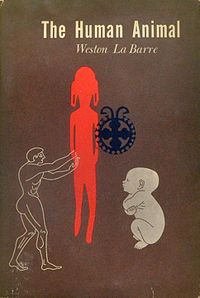 W
WThe Human Animal is a 1954 book by the anthropologist Weston La Barre, in which the author discusses the psychoanalytical approach to psychology and culture. The classicist Norman O. Brown described the book as the most significant attempt at creating a "general theory of language" through a synthesis of psychoanalysis with other disciplines.
 W
WLes Illusions de la Psychanalyse is a 1980 book about psychoanalysis by the Belgian psychoanalyst Jacques Van Rillaer, in which the author criticizes psychoanalytic theory and practice. Les Illusions de la Psychanalyse has been called a classic work.
 W
WThe Interpretation of Dreams is an 1899 book by Sigmund Freud, the founder of psychoanalysis, in which the author introduces his theory of the unconscious with respect to dream interpretation, and discusses what would later become the theory of the Oedipus complex. Freud revised the book at least eight times and, in the third edition, added an extensive section which treated dream symbolism very literally, following the influence of Wilhelm Stekel. Freud said of this work, "Insight such as this falls to one's lot but once in a lifetime."
 W
WIntroduction to Psychoanalysis or Introductory Lectures on Psycho-Analysis is a set of lectures given by Sigmund Freud, the founder of psychoanalysis, in 1915-1917. The 28 lectures offer an elementary stock-taking of his views of the unconscious, dreams, and the theory of neuroses at the time of writing, as well as offering some new technical material to the more advanced reader.
 W
WKnowledge and Human Interests is a 1968 book by the German philosopher Jürgen Habermas, in which the author discusses the development of the modern natural and human sciences. He criticizes Sigmund Freud, arguing that psychoanalysis is a branch of the humanities rather than a science, and provides a critique of the philosopher Friedrich Nietzsche.
 W
WLife Against Death: The Psychoanalytical Meaning of History is a book by the American classicist Norman O. Brown, in which the author offers a radical analysis and critique of the work of Sigmund Freud, tries to provide a theoretical rationale for a nonrepressive civilization, explores parallels between psychoanalysis and Martin Luther's theology, and draws on revolutionary themes in western religious thought, especially the body mysticism of Jakob Böhme and William Blake. It was the result of an interest in psychoanalysis that began when the philosopher Herbert Marcuse suggested to Brown that he should read Freud.
 W
WLove and Its Place in Nature: A Philosophical Interpretation of Freudian Psychoanalysis is a book about psychoanalysis by the philosopher Jonathan Lear, in which the author discusses the importance of love in Freudian theory.
 W
WThe Myth of the Birth of the Hero is a book by German psychoanalyst Otto Rank in which the author puts forth a psychoanalytical interpretation of mythological heroes, specifically with regard to legends about their births. The first edition of the book was published in 1909, and a greatly expanded second edition was published in 1922.
 W
WPhilosophical Essays on Freud is a 1982 anthology of articles about Sigmund Freud and psychoanalysis edited by the philosophers Richard Wollheim and James Hopkins. Published by Cambridge University Press, it includes an introduction from Hopkins and an essay from Wollheim, as well as selections from philosophers such as Ludwig Wittgenstein, Clark Glymour, Adam Morton, Stuart Hampshire, Brian O'Shaughnessy, Jean-Paul Sartre, Thomas Nagel, and Donald Davidson. The essays deal with philosophical questions raised by the work of Freud, including topics such as materialism, intentionality, and theories of the self's structure. They represent a range of different viewpoints, most of them from within the tradition of analytic philosophy. The book received a mixture of positive, mixed, and negative reviews. Commentators found the contributions included in the book to be of uneven value.
 W
WPsychoanalyse und Yoga is a 1923 book by the German writer and philosopher Oscar Adolf Hermann Schmitz. The book introduces the synthesis of the Indian yoga method and the European psychoanalysis with the aim to create a yoga system for Europeans. The content of his essay is an elaboration on a lecture series about yoga and psychoanalysis given at the psychoanalytic conference of the School of Wisdom, which took place on the 3rd until 5 March in 1923.
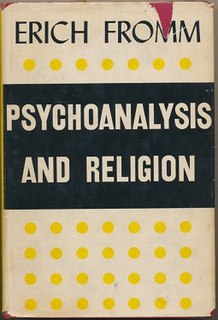 W
WPsychoanalysis and Religion is a 1950 book by social psychologist and psychoanalyst Erich Fromm, in which he attempts to explain the purpose and goals of psychoanalysis in relation to ethics and religion.
 W
WPsychoanalysis: The Impossible Profession is a 1981 book about psychoanalysis by the journalist Janet Malcolm. It was published by Alfred A. Knopf. The book received positive reviews.
 W
WThe Psychodynamic Diagnostic Manual (PDM) is a diagnostic handbook similar to the International Statistical Classification of Diseases and Related Health Problems (ICD) or the Diagnostic and Statistical Manual of Mental Disorders (DSM). The PDM was published on May 28, 2006.
 W
WPsychopathology of Everyday Life is a 1901 work by Sigmund Freud, the founder of psychoanalysis. Based on Freud's researches into slips and parapraxes from 1897 onwards, it became perhaps the best-known of all Freud's writings.
 W
WThe Question of Lay Analysis is a 1926 book by Sigmund Freud, the founder of psychoanalysis, advocating the right of non-doctors, or 'lay' people, to be psychoanalysts. It was written in response to Theodore Reik's being prosecuted for being a non-medical, or lay, analyst in Austria.
 W
WSexual Desire: A Philosophical Investigation, published as Sexual Desire: A Moral Philosophy of the Erotic in the United States, is a 1986 book about the philosophy of sex by the philosopher Roger Scruton, in which the author discusses sexual desire and erotic love, arguing against the idea that the former expresses the animal part of human nature while the latter is an expression of its rational side. The book was first published in the United Kingdom by Weidenfeld and Nicolson, and in the United States by Free Press.
 W
WSexual Dissidence: Augustine to Wilde, Freud to Foucault is a book about the philosophy of sex by the social theorist Jonathan Dollimore. The book received both positive and mixed reviews. Dollimore was complimented for his discussions of the theologian Augustine of Hippo and the writers Oscar Wilde and André Gide, but was criticized for his repetitive style of writing.
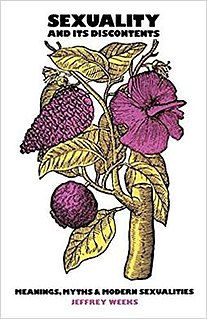 W
WSexuality and Its Discontents: Meanings, Myths, and Modern Sexualities is a 1985 book about the politics and philosophy of sex by the sociologist Jeffrey Weeks. The book received positive reviews, crediting Weeks with explaining the theories of sexologists and usefully discussing controversial sexual issues. However, Weeks was criticised for his treatment of feminism and sado-masochism.
 W
WTelevision: A Challenge to the Psychoanalytic Establishment is the 1990 English-language translation of Jacques Lacan’s text "Télévision" accompanied by a "Dossier on the Institutional Debate". The single volume thus includes two distinct projects which were separately translated.
 W
WThe Trauma of Birth is a 1924 book by the psychoanalyst Otto Rank. It was first published in English translation in 1929. It is Rank's most popular book. Sigmund Freud, the founder of psychoanalysis, reacted critically to The Trauma of Birth, responding to Rank's ideas in his own work.
 W
WThe Uses of Enchantment: The Meaning and Importance of Fairy Tales is a 1976 book by Bruno Bettelheim, in which the author analyzes fairy tales in terms of Freudian psychoanalysis. The book has been a subject of controversy regarding possible plagiarism.
 W
WValidation in the Clinical Theory of Psychoanalysis: A Study in the Philosophy of Psychoanalysis is a 1993 book about psychoanalysis, and related topics such as the nature and effectiveness of the placebo and its role in psychiatry and medicine, by the philosopher Adolf Grünbaum. The book, in part a sequel to Grünbaum's earlier The Foundations of Psychoanalysis (1984) and a response to analytic critics of that work, received both positive reviews and more mixed assessments. Reviewers found it an important work about both psychoanalysis and the concept of the placebo, but noted that Grünbaum's writing style made it difficult to read.